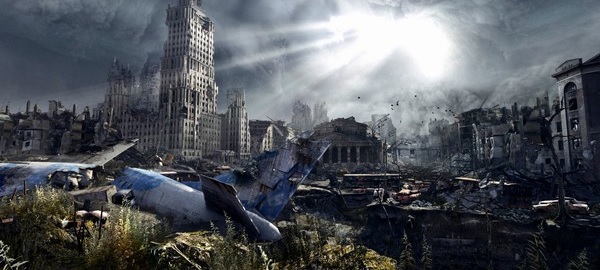Jason Rubin, former president of THQ, today posted a long letter – via GamesIndustry.Biz – in which he tried to defend 4A Games, the creators of Metro: Last Light. Jason claimed that the entire 4A studio would fit easily in the (underutilized) gym at EA Los Angeles’ offices, and that the budget of Last Light is less than some of its competitors spend on cut scenes, and a mere 10 percent of the budget of its biggest competitors.
Rubin also claimed that 4A Games faced a lot of ‘hostile environmental conditions’
“Power outages are the norm for 4A. All developers have deadlines, but I know of few that had to bring in construction generators to be able to work the weekend before final submission because an extra day meant missing shelf dates by weeks. Montreal is cold, but when it gets cold in Kiev it’s different. That’s because the government provides all of the heating through a central coal burning facility that pipes hot water to homes and offices. Unfortunately, it breaks down reliably a few times a year for a week at a time. Then 4A works in their parkas and struggles to keep their fingers warm in temperatures well below freezing. That is unless it snows and they get stuck home for a few days at a time because snow clearing isn’t up to Western standards.”
Everything that Rubin said made me sympathise 4A Games, but then the following two ‘things’ caught my eye. Rubin said that he wanted to offer 4A Games Aeron office chairs, but since there weren’t any outlets in the Ukraine, THQ’s only option was to pack a truck in Poland and try to find an “expediter” to help bribe its way down to Kiev. Ultimately, this would triple the cost, however that was not the reason why THQ gave up on doing it. So hold that thought everyone for a second and let’s move on to the closing paragraph.
Rubin concluded with this:
“If 4A had been given a more competitive budget, in a saner environment, hadn’t wasted a year-plus chasing the irrational requirement of THQ’s original producers to fit multiplayer and co-op into the same deadline and budget(!), hadn’t had to deal with the transition to a new publisher in the crucial few months before final, what could 4A have created?”
And with this I’m really puzzled. You see, Rubin has already confirmed that THQ would be willing to offer a – somehow – better environment but did not, because those damn chairs would “spread out people and computers, which would lead to extra desks, and that ultimately would have required bigger offices“. Seriously now? That was the only reason? Well how about a different type of chairs purchased from Kiev? Or why didn’t THQ offer this amount of money to 4A Games as a bonus? Why didn’t THQ offer better (do note, we’re talking about better which equals to warmer. Not bigger) offices?
What’s also ironic is that Rubin confirmed what we all knew; that 4A Games was experimenting with a multiplayer mode that – ultimately – was not featured in the final build. And this is truly ironic because a simple FOV slider would increase the sales of Metro: Last Light, thus the income revenue for both THQ and 4A Games. Yet the developers decided to avoid implementing such a ‘simple feature’ and wasted – as per Rubin’s words – one whole year to experiment with a multiplayer mode.
Which brings me to another series of questions. Why did THQ originally forced 4A Games to such a thing? As the president of THQ, why didn’t he interfere? Why was 4A Games allowed to waste so much time into this MP bullsh*t (that’s a rhetorical question. We know why THQ wanted an MP mode. It’s for the same reasons why all publishers want an MP mode in their games).
In short, we fully agree with Rubin that 4A Games is talented and did what they could to satisfy its publisher. However, its publisher is to be blamed for not offering luxury and a friendly (or warmer) environment. The publisher is to be blamed for wanting an MP mode in a truly SP game. And the publisher is to be blamed for not supporting a product it thought it had potential.
Before closing, let us remind you that THQ had already a number of unannounced projects under its sleeve. Atlas, Evolve and 1666 are three of them that will – most probably – never see the light of day. In other words, THQ wasted resources in those projects, and let’s not forget that Homefront 2 was also a title under development that was funded by the very same publisher.
Instead of focusing on what it currently had, THQ decided to expand and that backfired. And despite Rubin’s claims, it’s pretty obvious that THQ did not want to spend any extra money for Metro: Last Light’s development. Otherwise, the entire 4A team would be now sitting on a nice couch in a warm, warm office. But then again that couch would had an impact on the game’s development. Oh, the irony.

John is the founder and Editor in Chief at DSOGaming. He is a PC gaming fan and highly supports the modding and indie communities. Before creating DSOGaming, John worked on numerous gaming websites. While he is a die-hard PC gamer, his gaming roots can be found on consoles. John loved – and still does – the 16-bit consoles, and considers SNES to be one of the best consoles. Still, the PC platform won him over consoles. That was mainly due to 3DFX and its iconic dedicated 3D accelerator graphics card, Voodoo 2. John has also written a higher degree thesis on the “The Evolution of PC graphics cards.”
Contact: Email

